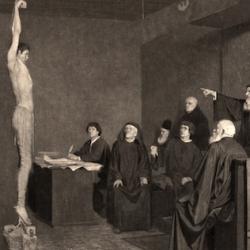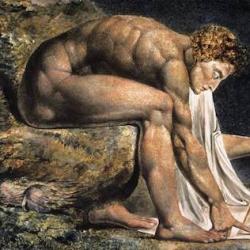Stephen Barr has a fine review of John Polkinghorne’s recent Science and the Trinity (Yale) in the May issue of First Things . Along the way, he offers some sharp and devastating criticisms of Polkinghorne’s unfortunate acceptance of open theism, which Polkinghorne accepts because, in Barr’s words, it “makes room for free will, simplifies theodicy, accords with the developmental nature of the world, and makes God’s knowledgte truer to that which is known.” Barr responds: “The first [argument] was demolished by St. Augustine, who pointed out that God’s knowledge of future acts no more renders them unfree than our own knowledge of past acts renders them unfree. The third and fourth argumentys are based on the fallacy that acts of knowing must partake of the qualities of the things known. (It is not true, for example, that one’s knowledge of smells is smelly, or that one’s knowledge of evil must be evil. No more, it would seem, must knowledge of change be changeable.)”
Perhaps most devastatingly, Barr (a particle physicist) argues that Polkinghorne adopts this revisionist theology without any pressure at all from science. On the contrary, “his position is open to the objection that it does not square with what physics has learned about the nature of time.” Consciousness, Barr notes, is divisible into past, present, and future, and “Newtonian physics projected this tripartite division onto the whole physical universe.” Einstein, however, showed that “there is no absolute meaning to the question of what is happening (or coming into being) ‘now’ throughout the whole universe. And if it is a mistake to project the timeline of our mental states onto the entire universe, it is even less justified to project it onto God, who infinitely transcends the universe.” To speak of “future” and “past” in a global sense is inconsistent with Einstein’s theory, so that Polkinghorne’s construal of God’s relationship to time “imposes upon the world exactly the one-dimensional temporal structure that physics tells us it does not have.”
Polkinghorne pushes the logic of his open theism to odd directions in Christology and Trinitarian theology. He suggests that there is a “temporal pole” and an “eternal pole” within the divine nature. When the Son was incarnate, he speculates, “it was the temporal pole of the Second Person that became incarnate,” while “the eternal pole continued its timeless participation in the divine essence and governance.” This is bizarre, if not simply heretical. He also suggests that the Trinity undermines the doctrine of God’s simplicity, suggesting that the Trinity “indicates a degree of complexity existing eternally within the divine nature.” But, as Barr points out, “the Trinity does not involve a split within the divine nature” but rather each Person “is understood to possess the whole divine nature.”
Barr ends with a compliment to Polkinghorne’s public witness as a Christian and scientist. Given the oddities of Polkinghorne’s theology, I am less than convinced that his witness is entirely to the good.













